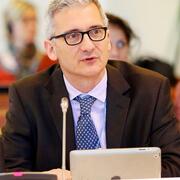
Author: Doug Gavel
From his perspective as Principal Advisor to the Directorate General for Climate Action in the European Commission (EC), Jacob Werksman is cautiously optimistic about the direction of international climate policy. Werksman was the expert guest in the Conversations on Climate Change and Energy Policy webinar discussion last Thursday (July 9). The webinar series is sponsored by the Harvard Project on Climate Agreements (HPCA), and the interviews are hosted by HPCA Director Robert Stavins, the A.J. Meyer Professor of Energy & Economic Development at Harvard Kennedy School. A recording of this webinar is available here.
“The resistance [to climate policy] begins to fall away as you begin to prove that we can address this problem and do it in a cost-effective way that brings you multiple benefits in addition to addressing the risk of climate change. So I am still overall hopeful,” he says.
Werksman has been involved in international climate change efforts for more than a decade since he began consulting for the Danish Government leading up to the 15th annual Conference of the Parties (COP-15) in Copenhagen in 2009. It was during that meeting, Werksman remarks, when two different models of international climate policy – the bottom-up ‘pledge and review’ approach versus the top-down legally binding agreement approach – first collided, all but derailing substantive action.
“Logistically there were huge problems,” he says. “A lot of people would certainly characterize it as not being the success at least that was hoped for.” But Stavins adds that “it did lay the foundation for Cancun, and everything after that, which in a sense, led to Paris.”
The Paris Agreement, reached at COP-21 in 2015, obligates signatories to establish and achieve meaningful emissions reduction targets through the use of nationally determined contributions (NDCs), which, when aggregated, are intended to limit the increase of global temperatures to less than two degrees centigrade above pre-industrial levels.
While that goal is jeopardized by the Trump Administration’s decision to withdraw from the Paris Agreement, Werksman is encouraged by the global response to that decision.
“The immediate impact of the Trump Administration’s withdrawal from Paris was that it helped to galvanize the international community around Paris. And you see that in the way in which no other party followed suit,” he says. “There may have been some that were on the edge of joining what they might have seen as a populist rejection of Paris and climate policy, but that didn’t happen.”
Werksman contends that the U.S. is increasingly isolated in its anti-Paris stance and that hopes are high in Europe that if President Trump is not re-elected in November, international climate efforts will regain new momentum.
“When there is an expectation that all countries, in particular the major economies, are looking at the level of commitment they’ve made already under the Paris Agreement, and they’re expected to by the end of this year indicate whether they can raise the level of ambition that’s reflected in those targets, that some of them are hesitating to see what the results of the U.S. election might be on the theory that the international community as a whole is likely to move more ambitiously with renewed U.S. participation and U.S. leadership,” he argues.
The webinar discussion also focuses on the European Green Deal, the European Commission’s proposed roadmap to address climate change by increasing the production of renewable energy and increasing energy efficiency, more stringently regulating emissions from industrial and energy sources, and seeking to reduce emissions in the building and transportation sectors.
“There was a lot of bold proposals in the original European Green Deal,” Werksman explains. “As they relate to the international process, they also contain a proposal to move from our existing Paris Agreement targets of at least 40 percent reduction of emissions from 1990 levels by 2030, to a 50 to 55 percent emissions reduction target. And it contains a climate neutrality goal by 2050. So the EU has committed to being a net zero economy, the first net zero region, by 2050. So these are very ambitious pushes in the direction of low-carbon and a climate-resilient economy.”
Werksman says that with the exception of the climate-neutrality goal, which has already been endorsed by EU leaders, all of the other action items in the European Green Deal will still require approval by the European Parliament and the European Council (where each member state has one vote).
A webinar viewer asked Werksman his assessment of the $100 billion dollar climate pledge made by the richest countries in 2009, prior to the Paris Agreement. Werksman responds that the Organisation for Economic Cooperation and Development (OECD), which tracks the fund raising efforts, estimates that $70 billion had been raised by 2018, while also stating that more needs to be done to better leverage private finance.
“There are significant public resources available, but we need to get better at using those through leverage and guarantees, participating with private sector banks in the shaping of softer loans in order to get the money flowing to a larger scale,” he remarks.
Stavins asked Werksman his opinion of the youth climate movements that swept through the United States and Europe last year, and Werksman responds that he finds them to be both “inspiring and sobering.”
“They had two messages. One was, we agree with everything that people like me have been saying about the need to act and to act urgently. And why haven't you succeeded? Why haven't you done better if we can talk in incremental terms about the kind of progress that we've been able to make moving from the Framework Convention to the Paris Agreement? But you try to explain to a young activist who doesn't see change on the ground how that is success after 30 years of effort and you quickly run out of words,” he says.
“I very much hope that when they're allowed back on the streets and back into the classrooms that they won't have forgotten this, and in particular when they're allowed into the voting booths, they won't have forgotten this and they will help make up for some of the shortfalls of the efforts that our generation has been making,” Werksman states.
The next Conversations on Climate Change and Energy Policy webinar is scheduled for 9 am ET August 19, when the guest will be Rachel Kyte, dean of the Fletcher School at Tufts University. Click here to register in advance for this webinar.
